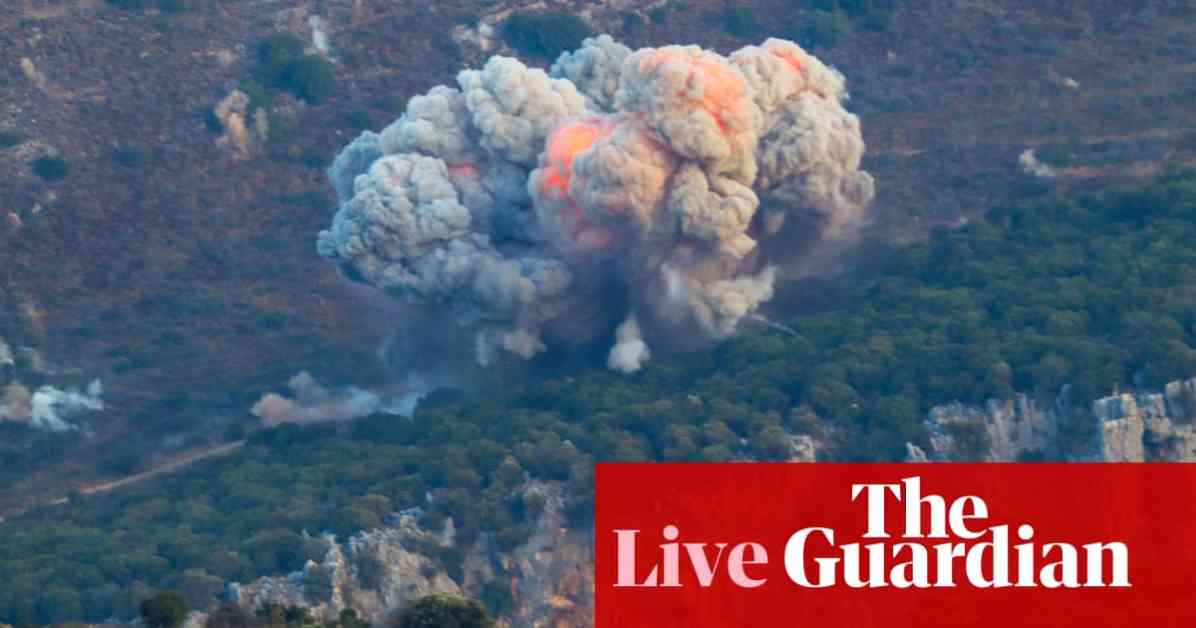Israeli Strikes in Southern Lebanon: One Killed and Six Wounded
In a recent escalation of tensions in the Middle East, Israel has launched airstrikes on multiple locations in southern Lebanon, resulting in one fatality and six injuries, according to Lebanon’s state-owned national news agency. The strikes targeted Hezbollah positions along the border, with reports indicating that a shepherd was killed and two of his family members were wounded. Additionally, four individuals were transferred to the hospital for treatment.
Israeli Ground Incursion of Lebanon Possible
The Israeli military has hinted at the possibility of a ground incursion into Lebanon to achieve its strategic objectives in the ongoing conflict with Hezbollah. IDF spokesperson Daniel Hagari stated that Israel initiated the airstrikes in response to perceived threats from Hezbollah. When questioned about the potential for a ground operation, Hagari emphasized that Israel would take any necessary actions to ensure the safety of evacuated residents in northern Israel.
According to Reuters, Monday’s airstrikes marked the most extensive bombing campaign conducted by Israel against Hezbollah targets in Lebanon in the past year. The Israeli Defense Forces deployed warplanes to carry out a wave of airstrikes in towns along the southern border of Lebanon and even further north, intensifying the already volatile situation in the region.
Live Updates
As the situation unfolds, the IDF has clarified that earlier reports of hostile aircraft in the western Galilee area were a false alarm, providing a momentary respite from the heightened tensions. However, the potential for further military actions remains a concern as both sides continue to engage in provocative maneuvers.
Israeli Response to Hezbollah Attacks
In response to Hezbollah’s rocket attacks on northern Israel, Israeli Prime Minister Benjamin Netanyahu and Defense Minister Yoav Gallant have vowed to deliver decisive blows to the militant group. Netanyahu emphasized that Israel would not hesitate to continue its operations until the safety of its citizens in the north is assured. President Isaac Herzog reiterated Israel’s right to self-defense while expressing a desire to avoid a full-scale war with Lebanon.
Hezbollah’s Provocation
The recent exchange of hostilities between Israel and Hezbollah has raised concerns about the escalation of violence in the region. Following a deadly Israeli airstrike in Beirut that claimed the life of a senior Hezbollah leader, the militant group retaliated by launching rockets into northern Israel, prompting a swift response from the Israeli military.
UN Secretary General António Guterres has warned of the potential for Lebanon to become another Gaza, highlighting the urgent need for de-escalation and diplomacy to prevent further bloodshed. The volatile situation poses a significant threat to regional stability, with both sides unwilling to back down from their entrenched positions.
Israeli Military Preparedness
Israeli Chief of the General Staff Herzi Halevi has affirmed the military’s readiness to confront any threats posed by Hezbollah and other hostile actors in the region. The IDF’s proactive stance reflects a commitment to safeguarding Israeli citizens and deterring future attacks on its territory.
International Reactions
The recent developments in the Israeli-Lebanese conflict have drawn international attention, with Iran’s Revolutionary Guards announcing the arrest of individuals accused of collaborating with Israel to undermine Iran’s security. The arrests, conducted in various Iranian provinces, underscore the complex web of geopolitical tensions that continue to shape the Middle East landscape.
Furthermore, the closure of Al Jazeera’s office in the West Bank by Israeli forces has sparked controversy, with the news channel vehemently denying allegations of incitement to terrorism. The move has raised concerns about press freedom and the right to information in the region.
Humanitarian Crisis in Gaza
Meanwhile, the ongoing conflict in Gaza has resulted in a humanitarian crisis, with thousands of Palestinians killed and injured in Israeli airstrikes. The toll on civilians, including children and displaced families seeking refuge in schools and shelters, highlights the urgent need for a ceasefire and humanitarian assistance to alleviate the suffering of innocent bystanders caught in the crossfire.
Looking Ahead
As tensions remain high in the Middle East, the prospects for peace and stability appear increasingly uncertain. Both Israel and Hezbollah must exercise restraint and engage in dialogue to prevent further escalation of violence. The international community, including the United Nations and regional stakeholders, must work together to facilitate diplomatic solutions and promote a lasting peace in the region.












